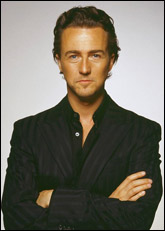All signs on Capitol Hill point to a royally depressing Earth Day 2005 (that would be next Friday): inertia on global warming, revival of the industry-friendly energy bill, a widely reviled plan to address mercury pollution, the looming prospect of drilling in the Arctic National Wildlife Refuge. And though it’s the 35th anniversary of the first Earth Day, D.C.-based environmental groups don’t seem to have plans for splashy protests or pep rallies to mark the occasion.

Matt Damon.
Photo: PBS.
Could it be that an infusion of star power from Hollywood is the best hope for pumping new life into the environmental movement? A coterie of A-listers, including actress Cameron Diaz, actor Matt Damon, and TV producer Laurie David, are spearheading planet-positive media projects just in time for the big green holiday.
On April 11 and 18, Damon is hosting Journey to Planet Earth, a PBS documentary series about the defining environmental problems of the 21st century — population explosion, resource scarcity, global warming, and the like — complete with a Bourne Identity-esque soundtrack and Hollywood special effects. On April 20 and 27, Ed Norton will narrate Strange Days on Planet Earth, a four-hour National Geographic special also airing on PBS that will examine modern environmental blights ranging from invasive insects that devour buildings to globe-trotting dust storms to the perplexing phenomenon of hermaphroditic frogs.
The filmmakers behind the projects see Damon and Norton not just as hotties who can attract younger viewers to PBS, but as representatives of a more energized and persuasive generation of activists. “It’s time for a new environmental movement,” said Marilyn Weiner, producer of Journey to Planet Earth. “Lawmakers are falling down on the job, there’s a major inspiration deficit in the public. [The movement] needs new people, new spokespersons, new methods of educating, fresh ad campaigns. We need urgency and celebration. We need drama that resonates with people and reminds them why they care.”

Edward Norton.
Photo: WGBH.
Then again, Damon and Norton are both Ivy League-educated and approach their subject matter with a sober, semi-academic tone that may still appeal largely to the white, bookish, bourgeois constituency of environmental groups. For hipsters, hip-hop aficionados, and, well, the vast majority of young Americans, thank god there’s Cameron Diaz. Her new eco-themed MTV series Trippin’ is breezy and irreverent — some might say a touch clueless — and that may give it a leg up with a generation that is to cluelessness as a fish is to water.
Airing on Monday nights (the third of 10 episodes ran this week), Trippin’ is equal parts Animal Planet, The Real World, and Dude, Where’s My Car? It’s based on a simple premise: Diaz takes a gaggle of show-biz pals to biologically rich hotspots around the globe where environmental experts guide them as they ogle Mother Nature and the exotic (read: poor) villagers who live therein, whilst attempting extreme adventures in the elements, such as surfing in Costa Rica, riding elephants in Nepal, sand-boarding in Chile, and trying to find two-way pager reception in the remote wilds of Yellowstone.
The show bucks the stereotypes associated with devotees of the natural world — serious, self-righteous white folks. A glance at the roster of Diaz’s adventuresome guests — hip-hop artists DMX and Redman, country rocker Kid Rock, Latina actress Eva Mendes, surf king Kelly Slater, and skater bad boy Eric Koston, to name a few — confirms that the show is attempting a radical makeover of the pasty eco-nerd identity. For that, Diaz deserves props from every greenie in the nation.
“We were well aware that doing a show about the environment would have narrow appeal to MTV viewers, so we had to approach it with a cast as diverse as possible, one that would have the broadest appeal,” Trippin’ co-producer Elizabeth Rogers told Muckraker. “The hip-hop community has a loud and powerful voice in that audience, so Cameron made a big effort to make those artists a part of the adventure.” Rogers and Diaz contemplated several outlets for the show, including ESPN, but decided that the MTV audience “is the most diverse and dynamic and has the most potential power to effect change,” said Rogers.

Cameron Diaz and a Nepalese elephant.
Photo: MTV.
Though Diaz and the show’s producers are serious enough in their environmental commitment to have gone “climate neutral” — they’ve purchased carbon credits to offset pollution from the energy used in creating the show — Diaz was adamant that Trippin’ not come off as preachy. “We didn’t want to turn people off with a we-know-best attitude,” said Rogers. “We knew that what we could bring to this show wasn’t expertise. Our expertise was just our enthusiasm, really, and love for the wilderness. That’s why Cameron makes it clear that she’s seeking out experts, and learning along the way, just like everybody else.”
Rogers makes no apologies that Trippin’ is entertaining first, educational second. “Our intention was to make it fun enough that by the end you don’t realize that you got something out of it,” she said. “Like it or not, that’s what kids want these days. I don’t think most people working on environmental messaging get that.”
Shocking as this revelation may be to devotees of Greenwire and Roll Call, it ain’t news to television producer Laurie David, who is currently working on two TV specials on the environment and global warming, to air on HBO and TBS in the next year. The latter will include comedy bits from Diaz, Ben Stiller, Tom Hanks, Steve Martin, Will Farrell, and Jack Black.
David is also trying to marry entertainment with politics by orchestrating a year-long “virtual march on Washington” via the website StopGlobalWarming.org. The aim is to attract at least a million marchers by Earth Day 2006 and thereby demonstrate to the powers in D.C. that the tides have turned and Americans want their leaders to take the threat of climate change seriously.
The central visual on the site will be a map of the United States that animates with Flash sequences as marchers virtually journey to dozens of spots around the country that are exhibiting symptoms of global warming. They’ll “visit” disappearing glaciers in Montana, damaged coral reefs in Florida, and towns in Alaska forced to relocate due to their melting surroundings. Sprinkled in amongst the gloomy destinations will be some inspirational stops — to zero-energy buildings, hybrid-car factories, fuel-cell laboratories, and the Indy 500 in Indiana, where all the race cars are being converted to run on biofuels. High-tech graphics will help marchers connect the ambiguous concept of global warming to real people and places. “We want to create an ongoing narrative that captures emotion and real life,” said Jonah Peretti, director of R&D at Eyebeam, a firm working to develop the site.
“Climate change is the ultimate civil-rights issue, and we need [to evoke] as much emotional resonance as the civil-rights movement to tackle it,” said David. “I want this to bring together Republicans, Democrats, soccer moms, college kids, jocks, religious people, northerners, southerners. Everybody.” To that end, the project will highlight the ties between global warming and other defining issues of our times: national security, public health, and economic development.
Democratic firebrand Robert F. Kennedy Jr. will play the role of “the first marcher” and send out a clarion call via email exhorting others to join. David is meeting with Sen. John McCain (R-Ariz.) this week in an effort to persuade him to be among the pioneering Republican marchers.
Leaders in the Green Group — a coalition of 20-plus top U.S. environmental organizations — have agreed to join the march and promote it among their constituencies. Indeed, the ultimate achievement of the project might be to help fuse the disparate efforts of national environmental groups related to climate change; as it is, they’ve each been taking separate stabs at addressing the problem rather than acting as a collective force.
Hollywood’s attempts at straightforward politicking in 2004 were less than fruitful, but now its Earth Day efforts are returning it to a milieu where it has no equal: entertainment. Whether hordes of Americans hit the virtual streets or tune in to Trippin’ or Strange Days on Planet Earth remains to be seen, but assuming the laws of American pop culture hold true, here’s a prediction: If you Diaz it, they will come.


